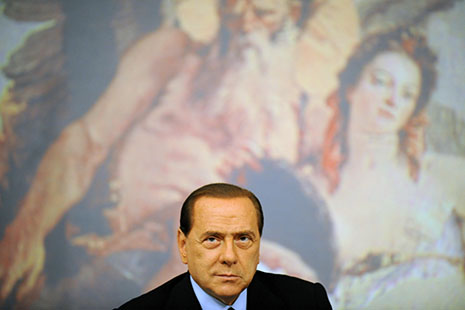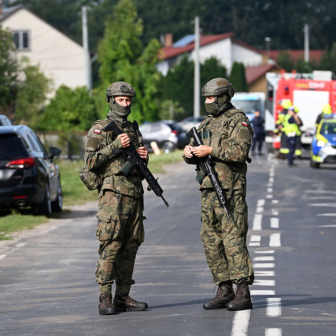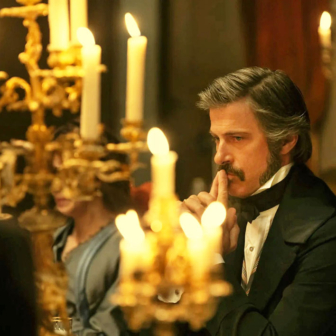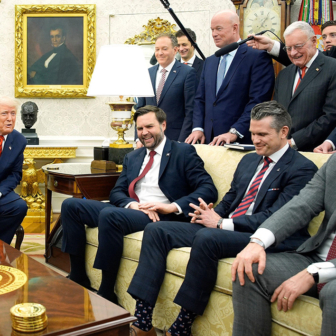ALTHOUGH the latest scandal swirling around Italy’s prime minister, Silvio Berlusconi, has been covered widely in the media it has attracted significantly less attention in Italy itself. The difference tells us much, not only about contemporary Italy but about the nature of Berlusconi’s rule, his relationship with ordinary Italians and the longstanding crisis that brought him to power and has made him Italy’s longest serving post-war leader.
The allegations that Berlusconi spent a night with Patrizia D’Addario, a forty-two-year-old escort, emerged from a criminal investigation of Giampaolo Tarantini, a businessman from the southern Italian town of Bari. Tarantini, an acquaintance of Berlusconi, is alleged to have abetted in prostitution by arranging escorts and models to attend private parties at the prime minister’s residence.
Whatever the truth of the current allegations, there is no doubt that a culture of illegality extends through and well beyond the Berlusconi government, and has a longer history than his prime ministership. This culture permeates Italian society, ranging from mafia involvement in building contracts and fixing football matches to political patronage and tax evasion. Berlusconi himself has been involved in a series of legal cases, the most recent of which involves the accusation that he bribed his British lawyer David Mills, the estranged husband of a British government minister, Tessa Jowell. Mills has recently received a prison sentence for giving false testimony on the Italian prime minister’s behalf; given the complex appeals system in Italy, he is unlikely to serve any of it.
To understand how Silvio Berlusconi has managed to survive for so long we need to go back to the early 1990s and the crisis known as Tangentopoli, or Bribesville – a period of corruption based on reciprocal favours, political patronage, false contracting and widespread economic fraud between politicians and businessmen. This crisis brought down the old Christian Democrat party, which had ruled for almost the entire period since the end of the second world war, and saw the escape into exile of Bettino Craxi, who had been the socialist prime minister between 1983 and 1987.
Craxi was a close friend of Berlusconi. He was also godfather to one of Berlusconi’s children by Veronica Lario, whose public criticism of her estranged husband initiated the current scandal. Both were Milanese and leading figures during the hedonistic, easy-money 1980s, which is summed up in the phrase Milano da bere (“the Milan you can drink”), borrowed from an advertisement for an Italian liqueur. It was under Craxi’s patronage that Berlusconi built his media empire. In 1984 Craxi issued a decree that enabled Berlusconi’s national commercial television network to return to the air after it had previously been ruled illegal. (Until that point only local commercial television had been allowed.) At a stroke, Berlusconi was free to introduce Dallas, Dynasty and The Smurfs to Italian living rooms, and his popularity began to take hold.
By 1992, along with many other politicians and businessmen, Craxi was under investigation on corruption charges related to the public financing of political parties. Two years later he fled to Tunisia (where he died in 2000) rather than face charges of corruption. As a result of the “clean hands” investigation led by Francesco Saverio Borrelli and Antonio Di Pietro, Italy’s ruling parties collapsed and a political vacuum was created. The investigations broadened and intensified, reaching into many sectors of Italian life. Meanwhile, although it was not as greatly affected by the scandal, the Italian left was undergoing its own identity crisis, with the Italian Communist Party (the largest communist party in western Europe) having recently transformed into the Democratic Left Party.
Berlusconi took the initiative. In late 1993 he had decided to take a more active role in politics, establishing the first Forza Italia political clubs, loosely based on the fan clubs of AC Milan (the football club owned by Berlusconi). In early 1994, after the March general election was announced, he sent to the media, including his own TV channels, a nine-minute video speech proclaiming that he was “taking the field” as leader of a new political force, Forza Italia.
Berlusconi’s first period in government ended after nine months when Umberto Bossi’s Northern League withdrew its support. Yet he was able to return to power in 2001 and then, for his current period, in 2008. His only rival for power, the Olive Tree coalition government of 1996–2001, led by Romano Prodi – the only one of seven centre-left leaders to have defeated Berlusconi at the polls – failed to develop into a broader reforming government, despite its initial promise and the economic prudence which enabled Italy to enter the Euro zone.
This failure to reform – reflecting a failure of Italy’s political class – combined with Berlusconi’s astute ability to consolidate his power base to fuel Italy’s ongoing crisis. Remarkably, Berlusconi has unrivalled popularity among Italians despite the lack of any evident improvement in the country’s economy. He has also been re-elected against the background of numerous scandals, of which the Patrizia D’Addario case is only the latest. Parliamentary immunity legislation introduced by his own government has more recently prevented further prosecutions and has helped sustain what is best described as a “regime” rather than a government.
Two of Berlusconi’s closest allies, Cesare Previti and Marcello Dell’Utri, have been convicted of corruption and mafia offences. After numerous charges and a lengthy appeals process, and after at one time being banned from holding public office, Previti resigned from the Italian parliament in 2007. Marcello Dell’Utri, senator and adviser to Berlusconi, has been found guilty of false accounting and mafia association, charges which he is currently appealing, though he has never spent time in jail. As well as the bad company he keeps, Berlusconi’s status on the world stage has never been certain; over a long period, his frequent gaffes have embarrassed Italy and its leader.
YET BERLUSCONI has been able to maintain support among ordinary Italians. He has done this by stressing his virtues and experience as a successful politician – as a clever risk-taking salesman rather than a cautious statesman. He is a postmodern populist, someone who is completely at home with the technological shifts of the contemporary world, which he has exploited through his economic and media power base. He is sometimes regarded as an “anti-political” politician, yet this can be misleading. It is Berlusconi’s style of leadership and unrivalled power that distinguishes him from other political leaders. Yet he has successfully cultivated an image of himself as an “outsider,” someone who is against the “system” and does not play by the rules.
Berlusconi’s unique access to the media has allowed him to speak to an “audience” as well as an “electorate,” while his own party Forza Italia closely reflects the structures of the post-industrial era. Influenced by football supporter clubs, it initially recruited from groups not previously involved in politics and lacks conventional democratic structures. Indeed, Berlusconi’s Forza Italia was not the only new political phenomenon on the right to emerge forcefully in the aftermath of Tangentopoli and the fall of the Berlin Wall. Gianfranco Fini’s post-fascist National Alliance dropped some of the baggage it carried as the heirs of Mussolini, while the regional and populist Northern League emerged forcefully to win sectors of the old working class as well as the small businessmen. Overall, the Italian right adapted much more quickly and emphatically than the left to the period after the big shakeup of parties in the early 1990s. Last year’s merging of Forza Italia with the post-fascist National Alliance into the People of Freedom Party only consolidated Berlusconi’s control. His other political allies depend on his power and patronage and there is no obvious successor from within its own ranks.
Much of the blame for Italy’s inability to reform rests with the centre-left parties, consistently outpaced, out-thought and out-manoeuvred by Berlusconi and his allies. The end of the Berlin Wall brought together Christian democrats and ex-communists who had previously been opponents. After being uncomfortable allies in the Olive Tree and Union coalitions, they finally agreed to merge into a single new party, the Democratic Party, in 2007–08. Yet constant wrangling and the persistence of old party interests has prevented a strong reform movement from forming, despite some promising civil society movements, such as the girotondi, a reformist movement led by the filmmaker Nanni Moretti, who directed the biting anti-Berlusconi satire Il Caimano.
The opposition remains weak and divided. It is in the midst of its own leadership crisis as it attempts to find someone able to do what only Romano Prodi has been able to do – namely, defeat Berlusconi. Although some new faces have appeared, the power remains with the older generation of leaders, such as Massimo D’Alema, Walter Veltroni and Francesco Rutelli. Despite their failures, they retain popularity among the party faithful. As the journalists Sergio Rizzo and Gian Antonio Stella have pointed out in their book La Casta (The Caste), the privileges of Italy’s political class extend across left and right. The old leaders have become untouchable and the consequences of their failures are now becoming clear in the opposition. All attempts to negotiate with Berlusconi on constitutional reform have ended in failure.
Two recent developments underline the problem. First, Antonio Di Pietro, the leader of the Italy of Values Party who led the Clean Hands anti-corruption movement in the early 1990s, has recently placed an advertisement in the International Herald Tribune calling on foreigners to help “save Italian democracy.” Second, the comic blogger Beppe Grillo has decided to stand for the leadership of the Democratic Party, the main opposition party, a decision that has shaken an already feeble opposition. These two developments are symptoms of the same problem – that there is neither an alternative leader nor a strong movement for change within Italy capable of delivering strong and credible government.
This means that even if Berlusconi is forced out at some stage there is no evidence to suggest that his successors are capable of driving through the reforms Italy urgently needs. Berlusconi’s own government allies depend to a large extent on his patronage, power and popularity with Italian voters. The Northern League, which was instrumental in bringing down Berlusconi’s first government in 1994 and which remains a key government ally, has an increasingly authoritarian and xenophobic agenda which would take Italy further from the European mainstream.
So Italy’s decline is likely to continue with or without Berlusconi. There are longstanding structural weaknesses in Italy’s economy which need cross-party collaboration and a strong reform package. Yet there is no big movement for reform and, with the exception of Di Pietro’s small party, no positive agenda for constitutional change which addresses the related problems of political corruption, conflicts of interest and the growing power of the mafia. A mark of the seriousness of Italy’s situation can be found in the belief among many Italians that the mafia will pick up the contracts for the rebuilding of L’Aquila – the earthquake-devastated city that hosted the recent G8 summit. We can expect another hot autumn in Italy, but little sign of long-term change in the country’s fortunes. •




